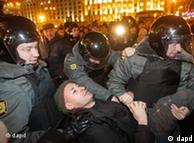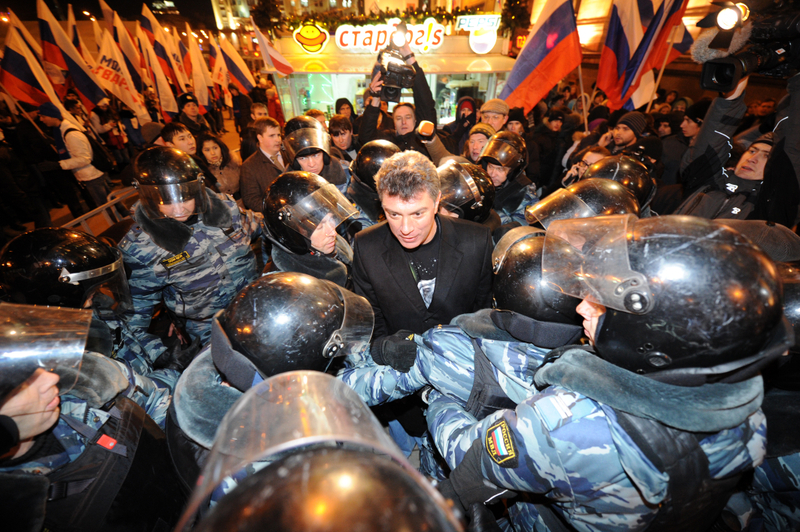【禁闻】国际人权日观中国人权:越压越反
| 唐人电视 www.ntdtv.com 2011-12-10 10:00 |
12月10号是国际人权日,中国的人权状况一直受到国内外的关注。致力于中国人权事业的人士表示,今年中共打压人权的现象仍然层出不穷,但是,中共越是打压,民众的抗争越是激烈。
在即将过去的2011年,从各种舆论和媒体报导中,我们可以了解到,中国各地都有违反人权的状况,包括非法拘禁、酷刑、关押访民、监禁记者、打压异议人士、迫害宗教信仰等事件。与此同时,民众反抗的声音也越发激烈。
《自由亚洲电台》消息,中国各地聚集在北京的访民计划在〝人权日〞当天,到联合国驻京机构求助,呼吁国际社会关注中国的人权状况。
上海400名访民则发出连署签名求助信,向联合国呼吁要人权。求助信还列举了上海维权人士冯正虎、毕和英、毛恒风、丁菊英、周敏珠等人遭当局打压的案例。
此外,上海、浙江等地的〝经租房讨房团〞,以及广州、贵州等地一批维权和异议人士也将于〝人权日〞进行维权抗争。
长期致力于中国人权事业的〝六四天网〞创办人黄琦,分析了今年中国大陆的人权状况。
〝六四天网〞创办人黄琦:〝在中国大陆,尽管打压的事件层出不穷,但是总体说来,由于海内外朋友大家共同的抗争,总体说来中国大陆的人权在走向好转。我们看到很多所谓的打压事件,是由于民众和社会各界共同抗争的事件多了,互联网更加发达了,所以一系列的打压事件在互联网上,在各种媒体上也暴露出来,走向宽松的环境是谁也挡不住的。〞
〝权利运动〞负责人胡军则认为,中共为了在十八大能顺利交接班,对民众的打压到了不可理喻的地步,他认为,中国的人权状况还在不断恶化。
胡军:〝中共它也知道它的体制现在已经支撑不长了,所以中共对人权的打压有点介乎于疯狂的地步了。像高智晟现在刑期都满了,都不知道高智晟在哪。像艾未未这件事情,一次次的进行打压。陈光诚是一个盲人,对一个盲人采取这么大范围的一个围堵,你作为一个国家,如此强大、如此强盛,有必要对一个盲人感到恐惧吗?〞
《德国之声》引述〝人权观察〞组织在5月间对外发布的消息,今年有200多人先后遭到强迫失踪、 逮捕、软禁、监视、传唤及暴力威胁。至少39名律师、维权人士和博主被刑事拘留。七人被正式逮捕,罪名是〝危害国家安全〞,还有18人〝被强迫失踪〞。
《参与网》消息,中共为应对〝人权日〞的来临,中国各地的维权人士、异议人士纷纷被国保〝请喝茶〞---- 约见。
〝贵州人权研讨会〞十多名活跃成员在上周二相继被带走后,至今仍被关押,人权研讨会也被当局定性为非法组织。
稍早有报导说,中国盲人维权律师陈光诚的境况稍有改善,不过《美国之音》的消息透露,又有多名声援他的网友遭到警方拘留或监控。
BBC也报导,总部设在美国的〝保护记者委员会〞 12月8号表示,中国被监禁的记者有27名,人数之多居世界第三。
此外,为了抗议中共暴政,从今年3月以来,中国境内已经发生了12起〝藏人自焚事件〞。
达赖喇嘛宗教基金会董事长 达瓦才仁:〝我认为,中国政府一贯的手法是对外说谎,对内高压。所以说在国外的人权组织应该有两个方面应该是非常有效的做出一些反应:一个是揭露他们的谎言,把真相介绍给国际社会,这是非常重要的。第二个是,要促使自己的政府或者团体,或者说议会对中国政府施加压力。〞
联合国于1948年12月10号通过了《世界人权宣言》,并规定每年的12月10号为〝国际人权日〞。而中国的人权状况一直受到外界谴责。
新唐人记者朱智善、李静、周天采访报导。
Talking about China's Human Rights on International Human Rights Day: the more the suppression, the more the resistance.
December 10 is International Human Rights Day.
China's human rights situation has been attracting international attention.
Human rights activists said that this year in China
the Chinese Communist Party (CCP) still continued to suppress human rights.
However, the more the CCP suppresses, the more people resist.
The year of 2011 will soon be over.
According to various public opinion notes and media reports,
we can see that there are human rights violations in many areas
of China, including illegal detention, torture,
detaining petitioners, suppression of dissidents, persecution
of beliefs and religions, and so on.
At the same time, the voices of people's resistance to
these measures are more and more intense.
"Radio Free Asia" reports that the petitioners gathering
in Beijing from various places,
are going to United Nations agencies in Beijing
asking for help on “Human Rights Day”.
They call on the international community to pay attention to
China's human rights situation.
Also 400 petitioners have sent out appeal letters together with
signatures demanding human rights from the UN.
The appeal letters also list some cases in which the authorities
are suppressing human rights in ShangHai,
including suppression to activists Feng Zhenghu, Bi Heying,
Mao Hanfeng, Ding Juying, Zhou Zhu and so on.
In addition to the usurped home owner groups in Shanghai,
Zhejiang and other places, activists and dissidents
in Guangzhou, Guizhou and other places will protest for
human rights on "Human Rights Day".
"June Fourth Sky net" founder Huang Qi, who has long been
committed to human rights, analyzed the human rights situation for this year in China.
"June Fourth Skynet" founder Huang Qi:
"In mainland China, despite the continuing suppression,
generally speaking, because of the supporting protests of
domestic and foreign friends, the human rights in mainland China are going in a good direction.
We have seen many instances of suppression.
The common protests of the public and all sectors in society are becoming more and more.
The internet is more and more developed,
therefore many suppression events are exposed on the internet and other media.
It will head towards a more relaxed environment which
no one is able to stop. "
Hu Jun, head of "Rights movement", thinks that the CCP
wants to carry out a smooth shift during the 18th session,
and so they have suppressed the public to an unreasonable extent.
He believes that the human rights situation in China is still deteriorating.
Hu Jun: “The CCP also knows its system
is now unsustainable in the long term.
Therefore the CCP has suppressed the people even to
the extent of insanity.
For example, Gao Zhisheng's prison term now is over,
but nobody knows where he is.
Also like the case of Ai Weiwei,
who was suppressed again and again.
And Chen Guangcheng who is blind. Against a blind person,
the CCP conducts such a large scale siege.
For such a powerful country is it necessary to be afraid of
a blind person to that extent?”
"Deutsche Welle" quoted the report of "Human Rights Watch"
released in May which said that this year,
more than 200 people were subjected to enforced disappearance,
arrest, house arrest, surveillance, subpoena and the threat of violence.
At least 39 lawyers, activists and bloggers suffered
criminal detention.
Among them, 7 people were formally arrested on charges
of "endangering national security", and 18 people were forced to 'disappear'.
"Participation Net" reports that the CCP is responding to
the coming "Human Rights Day" with activists and
dissidents across China being “asked to drink tea”, namely,
being asked to meet National Security personal.
More than a dozen active memmbers of "Guizhou seminar
on human rights" were taken away last Tuesday.
They are still being detained. Human rights seminars
are also characterized as an illegal organization by the CCP authorities.
Earlier, it was reported that the situation of Chinese blind
human rights lawyer Chen Guangcheng had slightly improved.
However, "Voice of America" reported that
quite a few netizens supporting him were detained or controlled by the police.
The BBC also reported that the US-based "protection Reporters
Committee" said on December 8 that there are 27 reporters jailed in China,
ranking it the third largest number in the world.
In addition, in order to protest against the CCP's tyranny,
since March, 12 incidents of "Tibetan self-immolation" have happened in China.
Dawa Tsering, Chairman of the board of the Dalai Lama
Religion Foundation, said: "I think the Chinese government's
consistent method is to lie outside, and to suppress inside.
So human rights organizations abroad should have two aspects to their effective responses.
One is to expose their lies, giving the truth to the international
community. This is very important.
The other is to urge their respective governments or organizations,
or Parliaments to put pressure on the Chinese government."
On the 10th of December 1948,
the United Nations adopted the "Declaration of Human Rights,"
and made the 10th of December
"International Human Rights Day" an annual event.
However, the human rights situation in China
has always been condemned by the outside world.
NTD reporters Zhu Zhishan, Li Jing and Zhou Tian











 莫斯科市中心的军用车辆
莫斯科市中心的军用车辆




